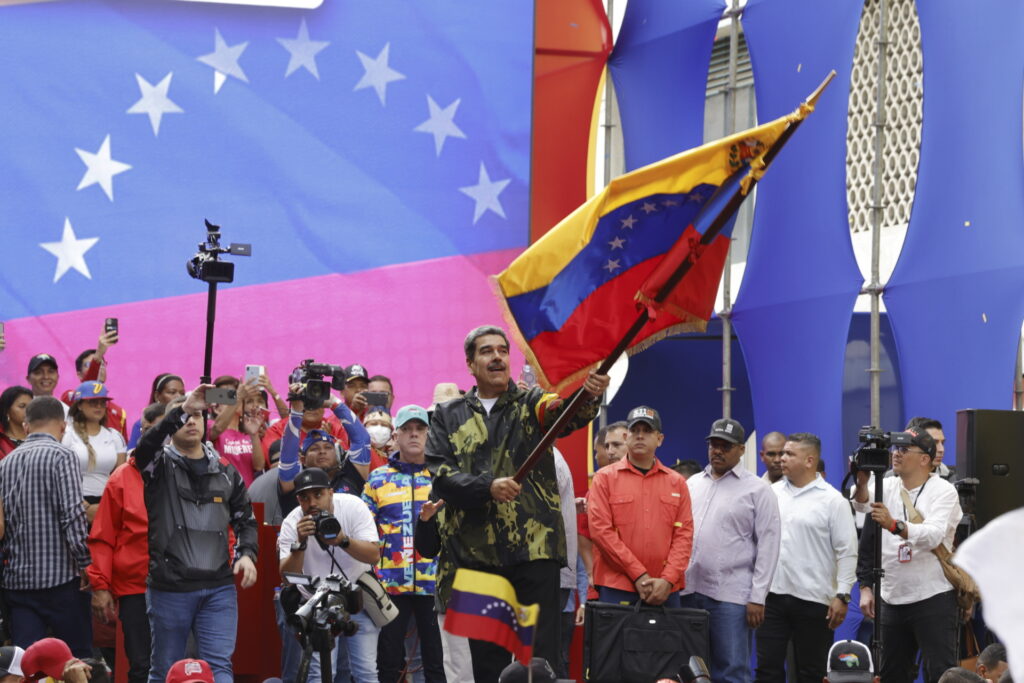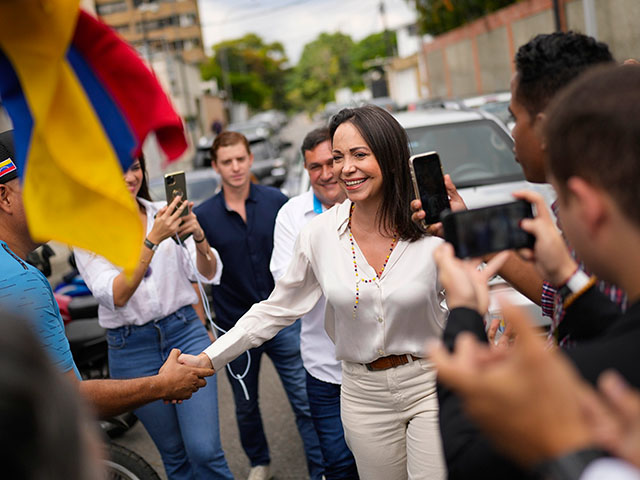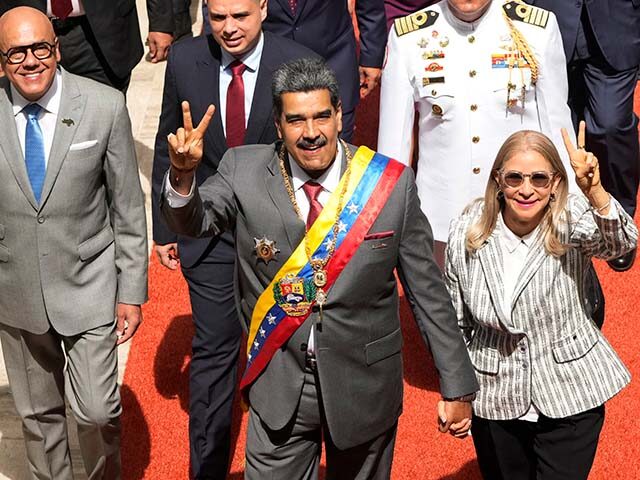Venezuelan dictator Nicolás Maduro declared on Thursday that the deal signed between his socialist regime and the Venezuelan “opposition” to hold a “free and fair” 2024 presidential election was “mortally wounded,” implying the cancellation of the election.
The agreements, signed in Barbados in October through the mediation of U.S. Secretary of State Antony Blinken, committed Maduro to taking steps towards holding a “free and fair” presidential election in the second half of 2024. Some of the steps included the lifting of bans on opposition politicians from running for office — including a ban on María Corina Machado, Maduro’s presumptive rival in the hypothetical electoral event. Maduro never lifted the ban and never fixed a date for the election at the time he declared the plan dead.

Venezuela’s President Nicolas Maduro waves his country’s national flag during an event marking the anniversary of the 1958 coup that overthrew dictator Marcos Perez Jimenez, in Caracas, Venezuela, on January 23, 2024. (AP Photo/Jesus Vargas)
In exchange for the apparently defunct promise of elections, the administration of leftist President Joe Biden awarded the rogue socialist regime a generous oil and gas sanctions relief package that is presently allowing the state-owned PDVSA oil company to once again freely sell Venezuelan oil and gas in the U.S. and international markets.
The sanctions relief package granted by President Joe Biden lifted sanctions imposed on PDVSA in 2019 during the administration of former President Donald Trump, who sanctioned the state oil company in response to myriad human rights violations by the socialist regime against its own people.
“Today, the Barbados agreements are mortally wounded. I declare them in intensive care, they were stabbed, they were kicked,” Maduro said during an official event. Maduro, despite never showing any signs of respecting his commitments, claimed that he hoped the agreements could be saved and that both sides could “push, through dialogue, great agreements of real national consensus, face to face, without hidden cards, without macabre plans.”
Maduro’s statements followed the launch of a crackdown on dissidents this week labeled “Bolivarian Fury,” an alleged response to the purported discovery of “foreign conspiracy plots” to kill Maduro and generate “violent and seditious actions” against the ruling socialist regime.
The first hours of the “Bolivarian Fury” crackdown saw the kidnapping of three of Machado’s campaign administrators, as well as attacks on the local headquarters of Machado’s party, Vente Venezuela, in at least ten of the nation’s states. Other political parties and civil organizations also reported vandalization.
Vente Venezuela released a statement on Thursday asking U.S. authorities to address the situation, given their involvement in the collapsing election deal.
“While the U.S. government makes concessions to the regime, such as the suspension of some sanctions, there are serious human rights violations in Venezuela, such as the arbitrary detention and forced disappearance of several Venezuelan regional leaders,” the statement read.
Machado appealed her ban to the nation’s socialist-controlled courts in December, but the courts are yet to issue a ruling. She thus presently remains banned from running in this year’s “free and fair” election and the Maduro regime has openly expressed its intention to uphold the ban.
Jorge Rodríguez, the head of the Venezuelan National Assembly, vehemently asserted during Thursday’s parliamentary session that “there is no way” that Machado will be a candidate for any Venezuelan election. Rodríguez condemned Machado for proposing the creation of peace units to crackdown on Venezuela’s organized crime groups and establish order in the country.
Rodríguez, who led the regime’s delegation during the Barbados negotiations, claimed that Machado’s proposal was actually a plan to exterminate Chavistas.

Supporters greet opposition presidential hopeful Maria Corina Machado as she arrives at a polling station to cast her ballot during the opposition primary election in Caracas, Venezuela, on October 22, 2023. (AP Photo/Matias Delacroix)
“This lady was told that she had to wash her face a little, Machado had to tone it down a little. They forgot to tell them to delete the tweets,” Rodríguez said, referring to posts on Twitter in which she made those claims. Rodríguez then claimed there would be elections in Venezuela regardless of the agreements, but Maduro would win them.
Rodríguez also accused Machado of allegedly being involved in plans for the “assassination of all Chavista leaders” and regime sympathizers.
“She didn’t even have the foresight to delete her posts, formerly called tweets, and I got what she calls her government program for the first few days after they exterminate us,” he said.
Rodríguez did not publicly offer any evidence that sustained all of his accusations against Machado.
At a later press conference, Rodríguez “swore” on his children that there will “never again” be free and fair elections, claiming that the “opposition” intends to “exterminate” democracy and “hand over” the country’s resources to foreign countries.
“Free and fair elections? Only for them, for the cursed caste of the surnames [referring to establishment “opposition” figureheads]. On my children, I swear, never again, because we know what you [Machado] are coming to,” he said. “When you talk about free and fair elections, include the people. They have the right to have the sanctions you asked for lifted.”
Polls released in November suggest that Machado, in an actual free and fair presidential election, would easily defeat Maduro, sweeping roughly 70 percent of the votes.
In an interview with the Colombian news channel NTN24, Brian Nichols, Assistant Secretary for Western Hemisphere Affairs, described the ongoing situation in Venezuela as “extremely worrisome,” nothing that the United States is “not seeing progress towards a competitive election in Venezuela.”
“It is an extremely difficult moment. It is harassment from officials of Vente Venezuela and other opposition parties, from campaign headquarters in different states. It is extremely worrisome,” Nichols said.
Nichols assured that if the agreements signed on Barbados do not materialize, then the United States is studying the possibility of reversing the sanctions relief package granted to the Maduro regime.
Christian K. Caruzo is a Venezuelan writer and documents life under socialism. You can follow him on Twitter here.

COMMENTS
Please let us know if you're having issues with commenting.